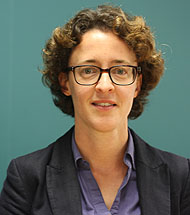2014_05_2014_ICS_Es difícil mantener la unión económica en la UE sin el compromiso y la solidaridad propias de una unión política
"Es difícil mantener la unión económica en la UE sin el compromiso y la solidaridad propias de una unión política"
Emma Cohen de Lara (Universidad de Ámsterdam) afirmó que "la ciudadanía no solo implica la aceptación de los derechos y deberes, sino también el desarrollo de lazos emocionales"

"El problema de la ciudadanía europea es importante. Resulta muy difícil mantener una unión económica sin el compromiso y la solidaridad propias de una unión política". Así se expresó en la Universidad de Navarra Emma Cohen de Lara, profesora de la Universidad de Ámsterdam, en el marco del congreso ‘La ética de la ciudadanía en el siglo XXI', que organiza el proyecto ‘Religión y sociedad civil' del Instituto Cultura y Sociedad (ICS) durante hoy y mañana.
Según la profesora Cohen de Lara, la "discrepancia entre esos dos ideales" se ha puesto aún más de manifiesto durante la crisis: "Muchos países europeos están viviendo un estancamiento económico y esto fomenta el rechazo político hacia la UE. En las elecciones del 25M ha crecido el apoyo a los euroescépticos: si los resultados sirven para clarificar y consolidar el estatus político de la Unión, el desarrollo de la ciudadanía europea se verá reforzada".
La experta de la Universidad de Ámsterdam hizo hincapié en la importancia de la dimensión afectiva en una comunidad política. "El liberalismo tiende a definir la ciudadanía como un conjunto específico de derechos y deberes articulados por el Estado. Sin embargo, esta visión solo recoge una parte de lo que significa ser ciudadano: no solo se trata de aceptar esos derechos y deberes, sino también implica el desarrollo de lazos emocionales con la comunidad", señaló.
Comunidad política mundial
Asimismo, se refirió al concepto de ciudadanía en el mundo actual. "El proceso de globalización supone una creciente movilidad de personas y bienes y también más niveles de cambio en los gobiernos. Todo esto mina al Estado-nación como proveedor estable de los derechos y deberes de los ciudadanos y genera inseguridad. La reacción de muchos países ante ello es aferrarse a la nación como fuente de identidad", apostilló.
"Algunos expertos –declaró- sostienen que existe una comunidad política mundial y, en consecuencia, que resulta posible una ciudadanía global. Sin embargo, cuando se trata de definir su contenido y su práctica a menudo nos quedamos con la idea de que es limitada".
Emma Cohen de Lara es una de las ponentes del congreso ‘La ética de la ciudadanía en el siglo XXI', que reúne a una treintena de expertos procedentes de centros académicos de Holanda, EE. UU., Italia, Nueva Zelanda y España, como la Universidad de Harvard o la Universidad Católica del Sacro Cuore.
